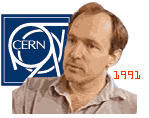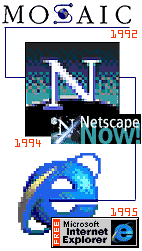 |
|||
 |
|||
A venerable institution of international collaboration was the setting for
the major development in the history of the Internet. It began when
Tim Berners-Lee, a computer programmer at CERN in Switzerland, got
to play on a new NeXT workstation. The object-oriented operating system
was an inspiration for a problem he was working on - how to distribute
information across a diverse network of different computers and
operating systems. He started working on a protocol very similar the
"docuverse" described by Ted Nelson, but reduced it down to a minimal,
working model.
In 1992, Marc Andreessen, an undergraduate computer
science major at the University of Illinois, was working at the Super
Computer Center when he discovered Berners-Lee's World Wide Web. There
were a few sites scattered around the world, including the first U.S.
site at the Stanford Linear Accelerator, but it was hard to use. Marc and
some of the other programmers knew they were looking at a great idea with
a bad presentation. They wanted to put a more "human face" on the Web, so
they wrote the first graphical browser - later to become Netscape.
Microsoft finally jumped onto the Internet in 1995,
offering a browser to compete with Netscape - a browser they called Internet
Explorer. It looked like the giant from Redmond, Washington would take
over the Internet just as they took over the OS market - but the
competition called foul. After 1995, every business was at least thinking about
getting a Web site. Online services exploded when they offered connections
to the Internet and the World Wide Web. Traffic on the Internet was
increasing at an exponential rate, and the old network backbones were
showing signs of collapse. Some of the ARPAnet pioneers were predicting
a collapse if something wasn't done soon.![]()
 The rise of the personal computer
by Apple and IBM introduced the rest of the world to computing. At
first, computers were the tools of technically inclined nerds, but
new applications drew other people to the keyboard. With an affordable
modem, people could connect with other computer enthusiasts and commercial
online services. People were using the computer as Bush and Licklider
had prophesized, as a medium to interact with other people.
The rise of the personal computer
by Apple and IBM introduced the rest of the world to computing. At
first, computers were the tools of technically inclined nerds, but
new applications drew other people to the keyboard. With an affordable
modem, people could connect with other computer enthusiasts and commercial
online services. People were using the computer as Bush and Licklider
had prophesized, as a medium to interact with other people.
[ chapters: electronic meeting places,
online services,
the well ]
 Berners-Lee eventually
named his project the World Wide Web, because he visualized it as a
web of interconnected documents that would stretch across the Internet
and the world. It sounded grandiose, but his predictions were later
proven too low.
Berners-Lee eventually
named his project the World Wide Web, because he visualized it as a
web of interconnected documents that would stretch across the Internet
and the world. It sounded grandiose, but his predictions were later
proven too low.
[ chapter: spinning the web ]
[ chapter: a human face ]
 Microsoft saw no profit in the Internet, because there were specific
laws against any profits on the Net. However, when Rep. Frederick Boucher
from Virginia drafted a bill in the U.S. Congress that would change all
that. Soon, the Internet was open for business.
Microsoft saw no profit in the Internet, because there were specific
laws against any profits on the Net. However, when Rep. Frederick Boucher
from Virginia drafted a bill in the U.S. Congress that would change all
that. Soon, the Internet was open for business.
[ chapter: open for business ]
[ chapter: the future of the internet ]
Next Section: Cast of Characters![]()
Copyright © 1998, PBS Online,
Inc. All Rights Reserved.
Site Designed and Developed by
OPB Learning Media